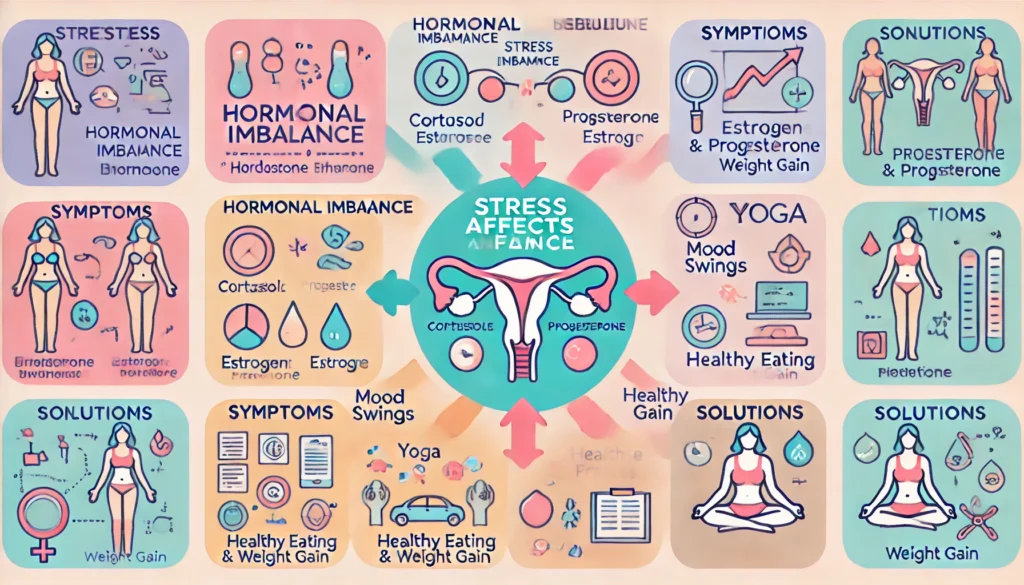Stress is an inevitable part of life, yet its impact on women’s health goes far beyond mental strain. In fact, stress significantly affects hormonal balance, disrupting essential bodily functions. When stress becomes chronic, it gradually triggers imbalances in cortisol, estrogen, progesterone, and thyroid hormones. As a result, women may experience irregular menstrual cycles, unexpected weight gain, persistent mood swings, and even fertility issues.
Understanding how stress alters hormonal harmony is crucial for managing its long-term effects. Therefore, by adopting specific lifestyle changes, making dietary adjustments, and practicing stress-relief techniques, women can successfully restore balance. This article explores the science behind stress-related hormonal imbalances and offers practical strategies to support overall hormonal health.

The Science Behind Stress and Hormones in Women
Stress activates the body’s hypothalamic-pituitary-adrenal (HPA) axis, which then releases cortisol, the primary stress hormone. Although this natural response is essential for survival during short-term stress, prolonged stress keeps the HPA axis activated, eventually creating hormonal imbalances.
Cortisol and Its Impact on Female Hormones
When stress persists, cortisol levels remain elevated, which gradually disrupts the delicate balance of other hormones.
- Estrogen Disruption: Chronic stress reduces estrogen production, which directly affects ovulation and menstrual regularity. Low estrogen can lead to mood swings, night sweats, and even vaginal dryness.
- Progesterone Imbalance: High cortisol depletes progesterone, which is the hormone responsible for calming the body. Consequently, women may experience heightened irritability, frequent anxiety, and ongoing sleep disturbances.
- Testosterone Reduction: Stress can also lower testosterone levels, which reduces libido and contributes to chronic fatigue.
- Thyroid Hormone Suppression: Elevated cortisol slows down thyroid hormone production, which may cause fatigue, unexplained weight gain, and sluggish metabolism.
The Cortisol-Insulin Connection
Chronic stress also impacts insulin regulation, which directly affects hormonal health. As cortisol levels rise, the body’s insulin sensitivity decreases. Consequently, elevated blood sugar levels may occur, gradually making the body more insulin-resistant. Over time, this can contribute to polycystic ovary syndrome (PCOS) and other metabolic imbalances in women.
Signs of Hormonal Imbalance Caused by Stress
Stress-induced hormonal fluctuations can gradually manifest in various physical and emotional symptoms.
Physical Symptoms
- Irregular Menstrual Cycles: Chronic stress can delay or suppress ovulation, which leads to irregular or missed periods.
- Weight Gain or Loss: Cortisol-driven insulin resistance frequently triggers weight gain, particularly around the abdomen.
- Fatigue and Low Energy: Imbalanced thyroid hormones often slow metabolism, causing persistent fatigue and sluggishness.
- Hair Loss: Stress disrupts estrogen balance, which may result in hair thinning and excessive shedding.
Emotional Symptoms
- Mood Swings: Hormonal fluctuations often intensify mood changes, leading to frequent irritability or sadness.
- Anxiety and Depression: Lowered progesterone and estrogen levels can increase both anxiety and depressive symptoms.
- Sleep Disturbances: Stress reduces melatonin production, which causes insomnia or frequent sleep disruptions.
How Stress Affects Women’s Reproductive Health
Hormonal imbalances caused by stress can directly impact reproductive health, which may lead to several complications.
Fertility Challenges
Chronic stress reduces progesterone levels, which are vital for maintaining pregnancy. As progesterone levels decline, ovulation may become irregular, gradually reducing fertility potential.
Polycystic Ovary Syndrome (PCOS)
Stress-induced insulin resistance may significantly contribute to PCOS development. Elevated cortisol levels worsen insulin sensitivity, which triggers excess androgen production, irregular ovulation, and infertility.
Hormonal-Related PMS and PMDD
Prolonged stress also intensifies premenstrual syndrome (PMS) symptoms. Women with hormonal imbalances frequently experience more severe cramps, mood swings, and bloating. Stress can also contribute to premenstrual dysphoric disorder (PMDD), a more severe form of PMS.
Hormones Affected by Stress in Women

Stress disturbs several key hormones, which creates a domino effect on overall health.
Cortisol
Cortisol, the primary stress hormone, increases during stressful situations. However, when chronically elevated, it disrupts menstrual cycles and slows down metabolism.
Estrogen
Estrogen plays a vital role in regulating the menstrual cycle and bone health. Therefore, stress-induced estrogen decline can cause irregular periods and mood disturbances.
Progesterone
Stress reduces progesterone production, which intensifies anxiety and sleep issues. Low progesterone also contributes to menstrual irregularities.
Insulin
Chronic stress makes cells more resistant to insulin, which raises blood sugar levels. Consequently, this may lead to weight gain, fatigue, and hormone-related disorders.
Thyroid Hormones
Stress suppresses thyroid function, which slows metabolism and may cause fatigue, weight gain, and hair thinning.
How to Balance Women’s Hormones Naturally
Although stress is unavoidable, making certain lifestyle changes can help restore hormonal balance.
Diet and Nutrition for Hormonal Balance
- Increase Magnesium Intake: Magnesium lowers cortisol levels, thereby promoting relaxation. Incorporate magnesium-rich foods such as spinach, almonds, and dark chocolate.
- Consume Omega-3 Fatty Acids: Omega-3s reduce inflammation and support hormonal health. Therefore, include fatty fish, flaxseeds, and walnuts in your diet.
- Limit Sugar and Processed Foods: Excess sugar spikes insulin levels, which worsens hormonal imbalances. Focus on whole, nutrient-dense foods instead.
- Stay Hydrated: Dehydration elevates cortisol levels, which increases stress. Thus, drink plenty of water throughout the day.
- Support Liver Health: The liver processes hormones. Therefore, eating cruciferous vegetables like broccoli and cauliflower helps detoxify excess estrogen.
Stress Management Techniques
- Mindful Meditation: Meditation reduces cortisol and promotes emotional well-being, thereby lowering overall stress.
- Deep Breathing Exercises: Controlled breathing calms the nervous system, which reduces stress-induced hormone imbalances.
- Yoga and Stretching: Yoga supports hormone regulation by lowering cortisol and promoting relaxation.
- Quality Sleep: Adequate rest balances cortisol and melatonin levels, thereby preventing hormonal disruptions.
Hormone-Supportive Supplements
- Adaptogens: Herbs like ashwagandha and rhodiola lower cortisol and support adrenal function.
- Vitamin B Complex: B vitamins enhance hormone production and reduce stress.
- Vitamin D: Supports estrogen balance and boosts mood, which may improve overall well-being.
Lifestyle Changes to Restore Hormonal Harmony
Incorporating lifestyle modifications is essential for long-term hormonal balance.
Regular Exercise
Physical activity reduces cortisol and promotes the production of endorphins. Therefore, opt for low-impact exercises like walking, swimming, or pilates to avoid cortisol spikes.
Stress Management Routines
- Time Management: Reducing stress through effective time management prevents cortisol buildup.
- Digital Detox: Taking breaks from digital screens reduces mental fatigue, thereby improving sleep quality.
Hydration and Sleep
- Drink Herbal Teas: Chamomile and passionflower teas promote relaxation, which supports hormonal balance.
- Establish a Sleep Routine: Consistent sleep patterns regulate melatonin and cortisol levels, thereby improving overall hormonal health.
When to Seek Professional Help
While lifestyle changes can significantly improve hormonal balance, medical intervention may be necessary for chronic imbalances.
Signs You Need Medical Support
- Severe PMS or PMDD Symptoms: Persistent, debilitating symptoms may require hormonal therapy.
- Infertility or Irregular Menstrual Cycles: Consult a gynecologist for fertility evaluation.
- Unexplained Weight Gain or Fatigue: Thyroid or adrenal dysfunction may require professional assessment.
Conclusion
Stress significantly impacts women’s hormonal balance, which affects reproductive health, mood, and overall well-being. Chronic stress disrupts cortisol, estrogen, progesterone, and thyroid hormone levels, which gradually leads to various health challenges. However, by adopting holistic lifestyle changes, women can effectively restore hormonal balance. Therefore, prioritizing stress management, maintaining a balanced diet, and seeking medical support when necessary can promote long-term hormonal health.


